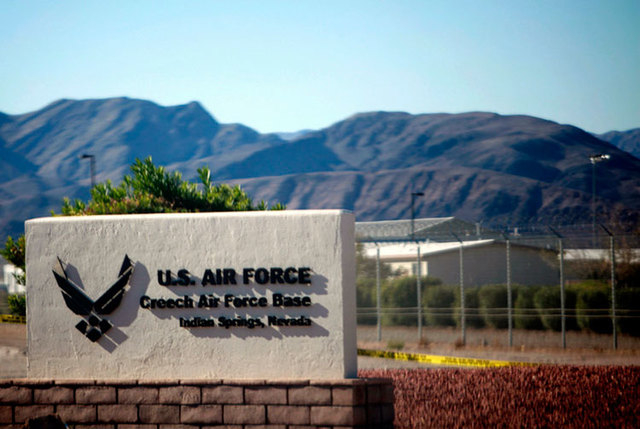Air Force backs down, lets Creech airman go without God
A Creech Air Force Base technical sergeant who scratched the words “so help me God” from his oath paperwork will be allowed to re-enlist, according to a legal opinion issued Wednesday by the Secretary of Defense General Counsel.
“The resulting opinion concluded that an individual may strike or omit the words ‘So help me God’ from an enlistment or appointment oath if preferred,” Lt. Col. Christoper P. Karns, an Air Force spokesman, wrote in an email.
He said the Air Force will soon update its instructions, but the policy change is effective now.
“Airmen who choose to omit the words ‘So help me God’ from enlistment and officer appointment oaths may do so,” he said.
The case of the Creech airman who challenged the legality of the oath requirement sent Air Force lawyers looking for direction from the Pentagon’s top attorney. Because the issue impacts all of the Department of Defense, the opinion is expected to be applied uniformly across all branches of the U.S. military.
Secretary of the Air Force Deborah Lee James said the Air Force takes “any instance in which Airmen report concerns regarding religious freedom seriously. We are making the appropriate adjustments to ensure our Airmen’s rights are protected,” she said in a post on the Air Force’s website.
The tech sergeant’s attorney, Monica Miller of the nonprofit American Humanist Association, threatened to sue his commanding officers on grounds that his First Amendment rights under the U.S. Constitution would be violated if he is not allowed omit the phrase in reciting his re-enlistment oath in November.
“The First Amendment guarantees the absolute freedom to believe and the freedom not to believe,” Miller said in a statement Wednesday. “The DOD’s decision confirms this vital principle and the rights of our client.”
The tech sergeant requested anonymity because he feared retaliation. Creech, 45 miles northwest of Las Vegas at Indian Springs, is a hub for remotely piloted aircraft, or drones.
“The government cannot compel a nonbeliever to take an oath that affirms the existence of a supreme being,” said Miller, an attorney with the association’s Appignani Humanist Legal Center. “Numerous cases affirm that atheists have the right to omit theistic language from enlistment or re-enlistment contracts.”
Miller said after the Creech tech sergeant struck the words “so help me God” from his re-enlistment contract he was told by his commanders Aug. 25 “that he must swear to God or leave the Air Force.”
Miller complained about the mandate in a Sept. 2 letter to the Air Force Office of Inspector General.
“Forcing (the tech sergeant) to swear to a supreme being as a condition of his reenlistment is tantamount to a ‘religious test’ and is therefore violative of his constitutional provision as well,” the letter reads. “Naturally, the Constitution trumps any statutory or regulatory language or requirements to the contrary.”
Air Force lawyers then requested the opinion from the Department of Defense General Counsel.
Last year, the American Humanist Association’s legal team represented Air Force officer trainee Jonathan Bise, who threatened to sue if he was required to say “so help me God” in swearing-in at his graduation at Alabama’s Maxwell Air Force Base. Instead, he was allowed to recite a secular oath without the phrase.
The Air Force judge advocate general later determined that statutes covering both the commissioning oath and enlistment oath don’t allow deletion of “so help me God.”
Language in the statutes mandates that a person enlisting or being commissioned “shall take the following oath,” which includes the phrase. Changing the laws to make “so help me God” optional would require congressional action.
Nevertheless, Miller said Bise has remained on active duty.
The oath ends with, “I will obey the orders of the President of the United States and the orders of the officers appointed over me, according to regulations and the Uniform Code of Military Justice. So help me God.”
It’s unclear what prompted the rule change.
The First Amendment’s Establishment Clause prohibits laws “respecting an establishment of religion,” or non-religion, as Miller sees it in the cases of the Creech and Maxwell airmen.
In regard to the Creech tech sergeant, Miller has said a challenge could also be made under the First Amendment’s Free Exercise Clause, which affords U.S. citizens the right to accept any religious belief.
The Court of Appeals for the Armed Forces has been reluctant to find constitutional conflicts with federal laws. When it was known as the Court of Military Appeals, a ruling in a 1992 criminal case found that “absent authority from the Supreme Court, we cannot declare” that a federal statute is unconstitutional.
Rep. Steven Horsford, D-Nev., whose district includes the Creech base, said he supports the decision.
“Airmen and Airwomen perform and fulfill their duty to protect the United States because they love their country: that is what truly matters when taking the oath,” he said in a prepared statement. “In conjunction with that vow, we celebrate the diverse beliefs and views that members of the Air Force hold. Our freedoms are only truly valuable when we respect them in practice.”
Contact Keith Rogers at krogers@reviewjournal.com or 702-383-0308. Find him on Twitter: @KeithRogers2.




















